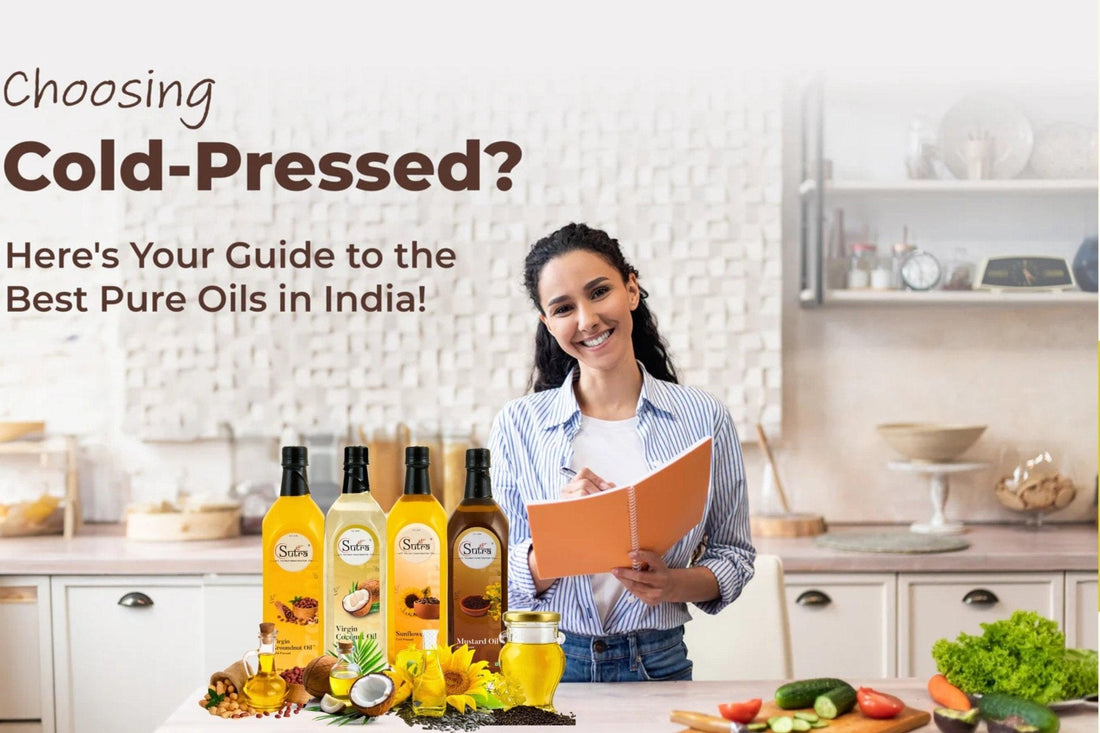Cold Pressed Oils vs Wooden Chekku Oils: What’s the Real Difference?

Cold Pressed Oils vs Wooden Chekku Oils: What’s the Real Difference?
Introduction: Oil That Keeps It Real
When we hear “cold pressed oil,” it often sounds like the healthiest option on the shelf. But what about “wooden chekku oil”? Are they the same? If not, which one is better? This blog clears the confusion between these two traditional oil extraction methods and helps you make an informed choice for your health and kitchen.
What is Cold Pressed Oil?
Cold pressed oils are extracted at low temperatures (below 45°C) without using chemicals or refining agents. Typically, these oils are extracted using steel or modern screw presses that apply pressure without generating heat. The result is oil that retains its natural aroma, flavor, and nutrients.
Key Characteristics of Cold Pressed Oils:
- Extracted below 45°C
- No refining, bleaching, or deodorizing
- Rich in antioxidants and healthy fats
- Often extracted using modern stainless steel presses
What is Wooden Chekku Oil?
“Chekku” is the Tamil word for a traditional wooden oil press. Wooden Chekku oil is a type of cold pressed oil, but with a major distinction—it is extracted using a wooden rotary churn (typically made of vaagai or neem wood). Seeds are crushed slowly, and natural materials like stone weights and wooden rods are used.
Unique Aspects of Wooden Chekku Oils:
- Uses wooden churners and stone base
- Operated slowly (RPM < 15)
- Preserves even more nutrients due to minimal frictional heat
- Traditional and spiritual significance in Indian households
Major Differences: Cold Pressed vs Wooden Chekku Oil
| Feature | Cold Pressed Oil | Wooden Chekku Oil |
|---|---|---|
| Extraction Method | Modern steel press or screw press | Traditional wooden rotary press (Chekku/Ghani) |
| Temperature | Below 45°C | Even lower due to slow speed |
| Speed (RPM) | 50–60 RPM | 10–15 RPM |
| Material Contact | Stainless steel | Neem/Wooden barrel + stone |
| Flavor and Aroma | Mild and clean | Richer, nutty, earthy flavor |
| Spiritual/Cultural Relevance | Modern health trend | Rooted in Indian tradition & Ayurveda |
Why Wooden Chekku Oil is Gaining Popularity
More Indian households are returning to traditional practices, including the use of wooden chekku oils. The slower speed, wooden materials, and lack of metallic contact means less oxidation and more retention of nutrients. These oils are considered “living oils” in Ayurveda—pure, raw, and sattvic (balanced for the body).
When Should You Choose Cold Pressed Oils?
If you're looking for availability, shelf life, and consistency in quality—modern cold pressed oils can be a reliable choice. They're widely distributed, especially in urban and semi-urban markets, and suitable for everyday cooking.
When Should You Choose Wooden Chekku Oils?
If you prioritize tradition, Ayurveda, purity, and spiritual use (like for lamps, naivedyam, or puja), wooden chekku oils are unmatched. They're ideal for:
- Temple offerings
- Baby massages
- Medicinal preparations
- Health-conscious low-heat cooking
Buyer Beware: Not All “Cold Pressed” Oils Are Equal
Many brands label their oils “cold pressed” without disclosing the extraction method or temperature. Ask these questions before buying:
- Is it made using wooden chekku or metal screw press?
- Is the oil extracted below 45°C?
- Are additives or preservatives used?
Always prefer local, transparent brands that allow you to trace the origin of your oil.
Conclusion: Cold Pressed vs Wooden Chekku – Which One Wins?
There’s no one-size-fits-all. Both cold pressed and wooden chekku oils are better than refined oils. However, if you're looking for oil that preserves ancient wisdom, health benefits, and flavor—wooden chekku oil is the gold standard.
Explore SutraKart’s Wooden Cold Pressed Oils
At SutraKart, we bring you freshly extracted, 100% pure wooden chekku oils made in small batches. From groundnut to sesame, every drop is crafted with care—just the way nature intended.
🛒 Shop Now: Wooden Cold Pressed Oils --- ## 🧾 Article Schema Markup (JSON-LD) ```json


